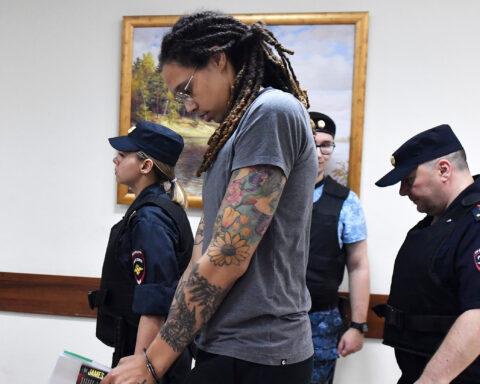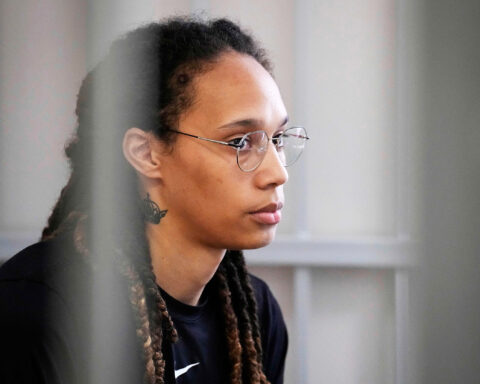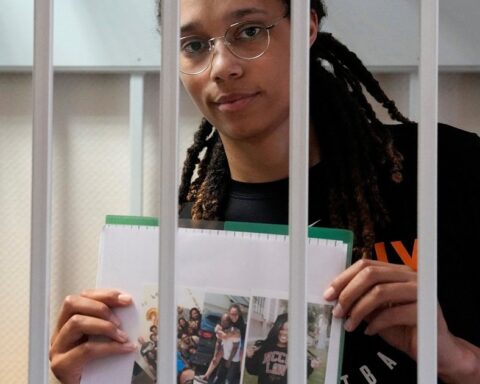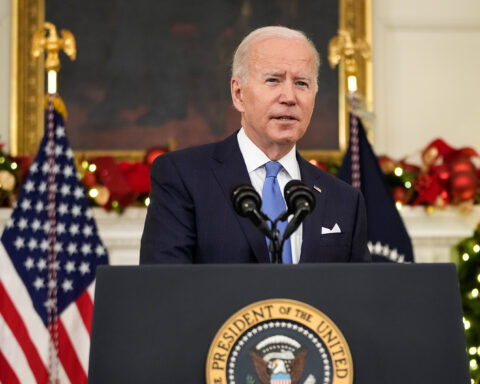Public calls and protests to have WNBA star Brittney Griner released from a Russian prison, where she has been held for a month on drug charges, could work against the Olympian’s case, according to experts and scholars.
Basketball Hall of Famer Lisa Leslie said on the podcast I Am Athlete last week that players and people associated with the league have been advised not to “make a big fuss” about Griner’s status.
“What we were told, and again this is all sort of passed along through hearsay, but what we were told was to not make a big fuss about it so that they could not use her as a pawn, so to speak, in this situation in the war,” Leslie said.
The message, she said, has been to avoid starting any sort of campaign that the Russian government could use as leverage, especially as Russia faces tough sanctions from the U.S. over its invasion of Ukraine.
“It is good for Griner that there is less media coverage,” Mitchell Orenstein, professor of Russian and Eastern European studies at the University of Pennsylvania, said
For Russia, Orenstein said, having Griner in prison is “a significant bargaining chip, and they would play it for all it’s worth. I would not expect them to give her up under any circumstances.”
The more her case is discussed, he added, the greater the potential of agitating Russia.
“The more media coverage, the more outrage there is,” he said, which would not help in the quest for Griner’s release.
Griner was arrested at Sheremetyevo Airport in Moscow last month when she got off a flight from New York. Russian customs officials said she had hashish oil cartridges in her bag, which were detected by a dog. Griner could face up to 10 years in one of Russia’s notorious detention centers, as the country’s invasion of Ukraine and its standoff with the West rages on.
Mario Williams, a civil rights attorney in Atlanta, said he found it ironic that Griner is being held on a drug charge when “Russia is notorious for doping its athletes with banned substances for a competitive advantage.”
“Yet we have never seen any of those athletes or guilty Russian officials facing criminal charges,” Williams said. “But now Russian officials have threatened Ms. Griner with up to 10 years in prison for an issue it could care less about. In truth, Ms. Griner is a political hostage taken because of pure political spite.”
Griner’s Russian lawyers challenged her detention and asked for house arrest. That appeal was denied earlier this month, and a May 19 date was set for a court appearance. The May hearing is to determine how much longer the court needs to extend her imprisonment, if at all.
Secretary of State Antony Blinken said earlier this month that the federal government would work to free Americans in Russian custody, including former Marines Paul Whelan and Trevor Reed, who have been incarcerated since 2018 and 2020, respectively.
Last week, State Department spokesman Ned Price told CNN that Griner is “in good condition.” He added that the department “will continue to work very closely with her legal team, with her broader network, to see to it that she is treated fairly.”
In the end, Williams, the attorney, contended that the tenuous nature of Griner’s case comes down to Russian President Vladimir Putin.
“Her situation is a stark reminder of the benefits we as United States citizens take for granted under our Constitution and laws,” he said. “Putin is unmistakably a dictator, and Ms. Griner’s arrest demonstrates his willingness to abuse his power for political messaging or purposes.”





